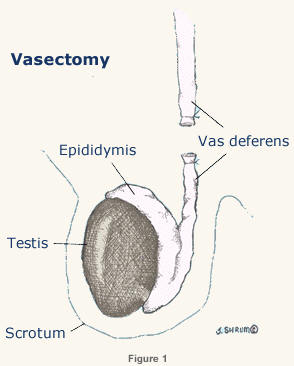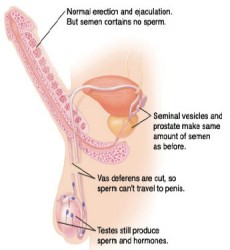




Forty years ago, couples didn't have to wonder if they were going to be able to conceive a baby. Fertility problems were almost unheard of. Now, the problem is so widespread that if fertility rates continue to drop at the current rate, the world's fertility will fall below the global replacement rate in the next 10 to 40 years.1
Although much of the blame is placed on women, the reality is that more than half of all cases of infertility may be related to male factors.2 A 2012 study revealed that just 1 in 4 men have optimal semen quality.3 By some estimates, sperm counts around the world may have dropped by 50% since the 1930s.4
No one knows for sure what's causing this disturbing decline, but it's clear that some of the factors that plague our modern world in general are at least partly to blame. For example, toxic chemicals that act as endocrine disruptors, such as insecticides, flame retardants, and phthalates from plastics, affect hormones responsible for sperm production, and excessive oxidant stress can damage DNA and impair sperm function.5-9 Obesity is an additional factor.10
Despite the alarming increase in male infertility, the good news is that in many cases it's completely reversible. Numerous studies demonstrate that certain nutrients can directly impact sperm quality—and can ultimately result in improved pregnancy rates.11-14
Declining Sperm Quality
In order to understand what causes male factor infertility, we have to understand the concept of sperm quality. Sperm quality is determined by four factors:
The total number of sperm cells produced (sperm count),
Their physical attributes (morphology),
Their ability to move properly once ejaculated (motility), and
The integrity of their DNA.
Under ideal circumstances, a healthy young American male can produce 300 to 500 million sperm cells per ejaculation—but typically only one will fertilize an egg.15 In the 1940s, most young men routinely produced an average of 100 million sperm cells per mL of semen—well above the roughly 40 million/mL required to assure normal fertility.16 But recent studies of modern young men show a disturbing trend: Sperm concentrations are declining with many men having less than 40 million/mL, the minimum required for reliable, timely impregnation.16,17
Other aspects of sperm quality are at risk as well. Sperm motility (the ability to move forward to reach the egg), the volume of semen per ejaculate, and the number of normal sperm cells carrying undamaged DNA have diminished over the same time period.18-20 Even the volume of the specific testicular cells that produce testosterone has been in decline.21
To resolve all of these male factors using a medical approach would require multiple medications—many of them unproven and with substantial side effects.22-24 Because of that, women are still the ones who undergo fertility treatments in order to allow men with poor sperm quality to father children—even if they're not the underlying cause of the problem.25,26
However, none of that may be necessary. Many studies have demonstrated that certain nutrients can have a direct impact on sperm quality itself, potentially avoiding the need for expensive drugs or invasive procedures.11-14
Carnitine Boosts Fertility Rates
Sperm cells have to travel farther than any other single human cell—and they need a tremendous amount of energy in order to make the trek. That's what makes carnitine such a vital nutrient for men with poor sperm quality.
Carnitine is a vital transporter molecule whose function is to carry high-energy fat compounds into mitochondria, where they are "burned" to release their energy. This helps give sperm the boost they need if they are going to have a chance at fertilizing an egg. This is important because weakly-swimming sperm (asthenozoospermia) is one of the most important reasons for male factor infertility.27
Supplementation with L-carnitine and/or acetyl-L-carnitine has proven benefits on sperm quality.28-34 Doses of 2,000-3,000 mg/day of L-carnitine, and 500-1,000 mg/day of acetyl-L-carnitine have produced increases of sperm count, motility, straight-swimming ability, as well as total normal sperm forms in clinical studies.30-34 When men were treated with carnitine, their partners experienced pregnancy ranging from 22 to 31%. The pregnancy rates in the control groups (not receiving carnitine) ranged from 1.7 to 3.8%.27,35
Effects of Antioxidants on Sperm Quality
Nutrient Daily Dose Improvements in Sperm Quality Improvement in Pregnancy Rate
Vitamin C74-77 1,000 mg Count, motility, structure 100% (in combination with vitamin E)13
Vitamin E12,78-80 300 mg to 1000 mg* Enhances sperm binding to egg, reduced sperm DNA damage 21%
Coenzyme Q10 (CoQ10)81-87 60 mg Count, motility 16%
Selenium11,88-92 200 to 225 mcg Motility (all measures of sperm quality in combination with NAC )91 10.8%(in combination with vitamin E)88
N-acetylcysteine (NAC )91 600 mg Motility, structure, count, and volume Not yet studied
Zinc93-98 66 mg Count Not yet studied
*Equivalent to 447-1,490 IU d-alpha-tocopherol (natural form) or 666-2,220 IU dl-alpha-tocopherol (synthetic form).99
Antioxidants Protect Developing Sperm
Because sperm cells need so much energy, they generate oxidation—which can ultimately damage cell membranes, DNA molecules, and the very mitochondria that power the cell in the first place.
There's a well-known association between oxidant stress, the antioxidant capacities of sperm cells and semen, and final sperm quality.36,37 In general, men with elevated markers of oxidation show impaired sperm count and more abnormally-formed cells.9 Conversely, good cellular antioxidant defenses have higher sperm counts and better motility. In other words, men with better sperm quality have higher overall intakes of antioxidant nutrients than men with poor sperm quality.38 That effect seems to be amplified in older men, many more of whom are choosing to start pregnancies than ever before.
A number of antioxidants have proven abilities to boost sperm quality. These include vitamins C and E, coenzyme Q10 (CoQ10), selenium, n-acetylcysteine (NAC), and zinc.
Let's take a look at zinc and NAC, antioxidants with especially potent abilities to enhance sperm quality.
Zinc
Zinc deficiency is associated with poor sperm quality resulting from increased oxidant stress in seminal plasma, the liquid portion of semen that is responsible for maintaining sperm cells in a healthy state.39,40 Depletion of zinc also reduces the volume of semen produced.41
Studies in both animal models and humans demonstrate significant improvements in sperm quality following zinc supplementation, especially in cases of known infertility. Supplementation increases sperm counts, mobility, and fertilizing capacity, and decreases levels of DNA damage, structural abnormalities in sperm, and levels of antibodies to sperm that can impair sperm quality.42,43 Studies show an increase of as much as 74% in total normal sperm count in previously sub-fertile men taking 66 mg/day of zinc, particularly when folic acid 5,000 mcg/day is added to the supplementation.44
The benefits of zinc supplementation are especially prominent in smokers, whose total body oxidant levels are vastly higher than those of nonsmokers. In addition, smokers accumulate toxic levels of another metal element, cadmium, which accumulates in testicular tissue and further adds to oxidant stress.45 These effects produce substantial losses of sperm quality and fertility in smokers.45 Studies show that zinc supplementation reduces the impact of cadmium toxicity and boosts sperm quality in smokers.45,46
What You Need to Know
NUTRITIONAL SUPPLEMENTS PROVIDE FRONTLINE MALE FERTILITY SUPPORT
Scientists have observed a worldwide decline in sperm quality, which is a measure of sperm count, motility, structure, and DNA integrity.
Left unchecked, this epidemic could spell massive reductions in the human fertility rate, especially in the industrialized nations where the problem is most acute.
Reasons for decreasing sperm quality are not fully understood, but clearly include certain major dietary and environmental factors that result from the modern age.
No medication has yet been found that can uniformly and safely improve sperm quality.
A large handful of nutritional supplements offers real hope for improvement in sperm quality and, more importantly, for improving fertility rates and the birth of healthy offspring.
Antioxidant vitamins and minerals, along with natural molecules such as coenzyme Q10, N-acetylcysteine, lycopene, carnitine, omega-3 fatty acids, vitamin D, and Ashwaganda (Withania somnifera) all improve sperm quality with near zero side effects.
N-Acetylcysteine (NAC)
N-acetylcysteine (NAC) is a modified amino acid with potent direct antioxidant effects; it also boosts natural cellular antioxidant systems such as glutathione. NAC was first used to reverse oxidative toxicity produced by overdoses of acetaminophen (Tylenol® and others), and found later use in reducing the viscosity (thickness) of secretions on cystic fibrosis.
Both of these characteristics of NAC make it appealing as a means of boosting overall sperm and semen quality.
As an antioxidant, NAC has been shown to reduce concentrations of destructive reactive oxygen species in human semen, contributing to improvements in motility.47,48 A dose of 600 mg/day of oral NAC improved volume and motility in men with known male factor infertility.48 And, like zinc, NAC's antioxidant powers make it an effective antidote for toxic chemicals that have negative effects on sperm quality: experiments in mice demonstrate that NAC supplementation can reverse the effects of arsenic, a well-known environmental toxin.49
NAC's ability to reduce viscosity in body secretions provides an additional asset. The same 600 mg/day dose reduces semen viscosity, making it easier for sperm to move forward and reach their goal of fertilizing an egg cell.48
NAC, both alone and in combination with selenium supplements, helps to raise serum testosterone levels as well as improving parameters of sperm quality.50
What You Need to Know
ANTIOXIDANT NUTRIENT COMBINATIONS BOOST SPERM QUALITY, ESPECIALLY IN OLDER MEN
More and more men are deciding to become fathers later and later in life, according to recent studies.100 That trend raises important questions about the impact of the father's age on the outcome of the pregnancy and the health of the infant.
Most data suggest substantial risk factors associated with increased paternal age, factors that can influence both fertility (the likelihood of conceiving) and genetic risk for the offspring.100
For these reasons, older men must be especially careful to load the dice as much in their favor as possible, in order to maximize their chances of successful conception and healthy fatherhood.
Two recent studies on dietary antioxidant combinations provide an excellent guide.
In the first study, researchers examined micronutrient intake in a group of men 22 to 80 years old.101They determined the amount of sperm DNA damage as a marker of overall sperm health.
Overall, the study showed that men with the highest intake of vitamins C and E, folate, and zinc, had roughly 16% less sperm DNA damage than did men with lower intakes of these antioxidant nutrients. The benefit was enhanced among the older members of the study group (ages 44-80); in fact, men in that group with the highest overall intake of those micronutrients showed levels of sperm damage similar to those of the younger men.101
The second study involved a group of men who were known to be infertile by reason of low sperm counts with abnormally formed sperm.102 Researchers provided the subjects with an oral antioxidant supplement containing l-carnitine, vitamin C, coenzyme Q10, vitamin E, zinc, folate, selenium, and vitamin B12 over a 3-month time period.
There was a significant improvement in DNA integrity and the proportion of sperm cells with highly degraded DNA, at all time points evaluated.102 At the same time, there were significant increases in other measures of sperm quality such as concentration, motility, vitality, and structure.
These studies offer new hope for the growing number of men who seek to start (or grow) their families later in life. A broad-spectrum plan of supplementation with multiple antioxidant nutrients seems likely to boost a man's overall chances of successfully initiating a healthy pregnancy.
Lycopene Helps Reverse Male Infertility
Lycopene is a natural, plant-derived carotenoid pigment that provides the red color of tomatoes, watermelon, and other fruits. It has powerful antioxidant characteristics and is involved in a variety of other cellular activities as well.
Low intake of lycopene in the diet is associated with poor semen quality and male factor infertility.38,51 However, supplementing with lycopene has been shown to reverse some or all of that damage.
In one study, men with impaired fertility were given 2 mg of lycopene twice daily. The results were impressive: 66% had improved sperm concentration, 53% had improved motility, and 46% showed improved numbers of normal sperm forms.52 Twenty-three percent of men in this study achieved fatherhood.
Another way lycopene enhances sperm quality is by reducing the impact of advanced glycation endproducts (AGEs), the dangerous sugar/protein structures that form over a lifetime of exposure to blood glucose. In one study, supplementing with 20 mg of lycopene daily resulted in decreased presence of sRAGE, a marker of AGE activity in semen.53
Omega-3 Fatty Acids Improve Sperm Count
In addition to their need to travel long distances, sperm cells must have very specific membrane characteristics in order to be able to bind to the membrane of an egg and produce a living embryo. Much of those special characteristics come from the sperm's high levels of omega-3 fatty acids.54,55
Men with defects in sperm quality or sperm counts typically have low levels of omega-3s, or low ratios of omega-3 to omega-6 fats, in their semen and sperm cell composition.54,56,57 On the other hand, higher omega-3 levels and ratios are directly correlated with improved sperm motility, concentration, and structure.54
Lab and animal studies reveal that sperm cells supplemented with omega-3s have improved motility and fewer markers of oxidative stress compared with control cells.58,59 Omega-3 fats, (specifically EPA and DHA), have been found to restore fertility and impaired sperm production in animal studies.60,61 Human studies show that supplementing with 1,840 mg a day of a combination of DHA and EPA improved total sperm count and concentration.62 An omega-3-rich Mediterranean-style diet boosts the chances of successful pregnancy in previously-infertile couples by 40%.61
Vitamin D Deficiency Contributes to Infertility
One study examining spermatozoa quality found 44% of the men studied had 25-hydroxyvitamin D blood levels below 20 ng/mL. Optimal levels are over 50 ng/mL, so these men were seriously deficient in vitamin D, as most people are who don't supplement with more than 5,000 IU/day. This could have a huge impact on the rising rate of male factor infertility. Serum vitamin D levels are positively correlated with sperm motility and normal structure.63
It was not until 2006 that a receptor molecule for vitamin D was detected on the surface of sperm cells.64,65 Since that time, the receptor has been found in all tissues of the male reproductive tract.66
Vitamin D deficiency reduces the ability of male lab animals to deposit sperm in female reproductive tracts by 45%, and the rate of successful pregnancies in females who received sperm from D-deficient males is decreased by 73%.67
However, when vitamin D is added to live human sperm cells in the lab, it produces a sharp increase in sperm motility, along with rapid development of the "acrosome reaction" that allows the sperm cell to attach to the egg.66
Although no human studies have been reported on the impact of vitamin D supplementation on male factor infertility, men facing fertility problems should still consider supplementing with this nutrient—especially given the powerful effects of vitamin D in lab and animal studies, coupled with the high rates of vitamin D insufficiency and deficiency among Americans. At the very least, consider supplementing to bring plasma vitamin D levels into the range considered sufficient by conventional medicine (greater than 32 ng/mL) range. This can often be accomplished by daily supplementation with vitamin D3 at 1,000 to 2,000 IU/day, though up to 5,000 IU is safe and may be needed in certain cases.68-70
Ashwagandha Improves Sperm Quality
Stress is a major factor in the modern infertility epidemic. It increases oxidative damage, inflammation, and other harmful conditions that are known to reduce sperm quality.71
One way to combat stress-related infertility is with a plant used in Ayurvedic and other traditional medical systems for reducing stress. Studies have shown that Ashwagandha (Withania somnifera) can treat stress-related infertility.71
When 60 infertile men took Ashwagandha root powder daily for 3 months, they experienced decreased measures of stress, increased levels of antioxidants, and improved overall sperm quality.71 By the end of the 3 months, the partners of 14% of those men had conceived pregnancies.
Ashwagandha extract works in several ways to improve sperm quality: It inhibits lipid peroxidation, reduces markers of glycation, improves seminal levels of antioxidant enzymes and vitamins A, C, and E, and increases serum testosterone and other reproductively critical hormones.72,73
Summary
The global decline in sperm quality, especially prominent in industrialized nations, has the potential to threaten the survival of humankind. Many reasons for this decline have been proposed, the strongest of which have to do with environmental and dietary factors unique to the modern age.
Since male factor infertility accounts for more than half of all infertility cases, it is incumbent upon men to optimize their sperm quality. Sadly, no medication or conventional medical treatment seems capable of reversing this dangerous trend.
Nutritional supplements often hold out hope where pharmaceutical medicine fails, and the area of sperm quality is no exception. Antioxidant and cell energizing nutrients can improve sperm motility, sperm count, and the number of normal sperm cells, while reducing damage to sperm DNA—ultimately improving the chances of successful pregnancy.






